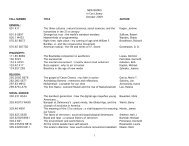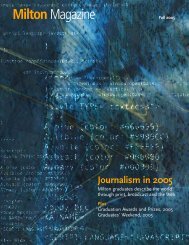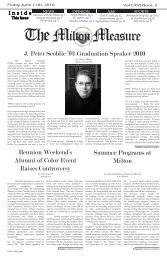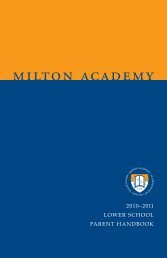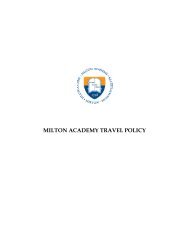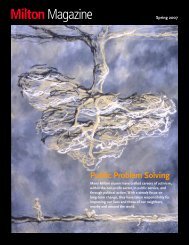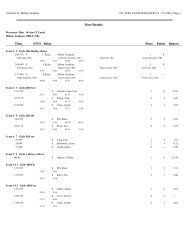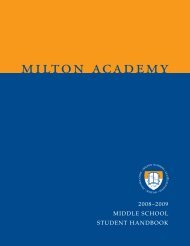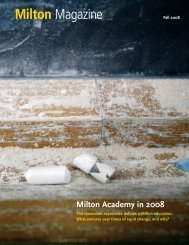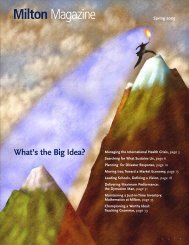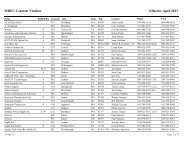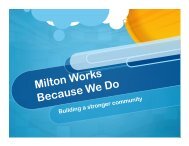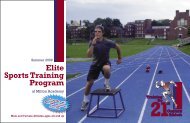Graduation Issue June 2011 - Milton Academy
Graduation Issue June 2011 - Milton Academy
Graduation Issue June 2011 - Milton Academy
- No tags were found...
Create successful ePaper yourself
Turn your PDF publications into a flip-book with our unique Google optimized e-Paper software.
HELIX<strong>Milton</strong> Helix <strong>Academy</strong>’s Science Magazine<strong>Graduation</strong> <strong>Issue</strong> <strong>June</strong> <strong>2011</strong>
Our most heartfelt thanks to all of the members of last year’s board:Editors-in-chief: Sam Karlinski and Naveen JastyCopy Editor: Charlie MaloneManager: Angie BerkowitzLayout Editor: Seowon OhAssistant Layout Editor: Ashley BaeFaculty Advisor: Dr. EysterDrawing of three paramecia under a light microscope by Yoona Lee
Helix-<strong>Graduation</strong> <strong>2011</strong>Table of ContentsSam Karlinski(Persky <strong>2011</strong> Science Journalism Award winner)Naveen JastyAndrew BeaudoinAlice BeckerMichael CharBrian KongRichard KongYoona LeeIsabelle LelogeaisDiana PerryYuleissy RamirezSatto TonegawaTory TrippeFarzan Vafap. 3p. 5p. 7p. 9p. 11p. 13p. 15p. 17p. 19p. 21p. 23p. 25p. 27p. 29*This is our graduation issue, which comprises interviews ofpotential science majors who agreed to be interviewed.*Cover image: Scanning Electron Micrograph of various pollen.http://upload.wikimedia.org/wikipedia/commons/a/a4/Misc_pollen.jpgp. 2
Helix-<strong>Graduation</strong> <strong>2011</strong>Sam KarlinskiBy Yuta Inumaru ’13Yuta Inumaru: What do you want tomajor in when you are at college?Sam Karlinski: I’m undecided rightnow, but probably chemistry, biochemistry,or molecular biology.YI: Did any courses or teachers at<strong>Milton</strong> lead you to choose a path inscience?SK: Not really. I was already prettysure from the day that I came to<strong>Milton</strong> that I wanted to pursuescience. My dad works in science, which put me in contact with the subjectfrom an early age.YI: What science courses have you taken at <strong>Milton</strong>?SK: Freshman PhysicsHonors ChemistryHonors BiologyAdvanced ChemistryNuclear PhysicsGeneticsYI: Were you involved in any science clubs?SK: I was a writer for Helix my junior year and editor-in-chief of thep. 3
magazine this year.Helix-<strong>Graduation</strong> <strong>2011</strong>YI: How was your experience as editor-in-chief of Helix?SK: It was a very fun and unique experience. Science writing is verydifferent from “normal” writing and it takes a bit of time to learn. I was veryproud as editor to observe the writers’ articles radically improve over thecourse of the year. This year was a bit of a transition year where we tried totake the club to the next level. We focused a lot of our time inimproving and changing the layout of our issues as well as publishing moreissues. Naveen and I strongly believe that Brian and Penny are going to doa great job next year in continuing what we have started.YI: Do you have a favorite science experiment that you did here at <strong>Milton</strong>?SK: Mr. Sando’s Physics class was very entertaining and his demonstrationswere rather memorable. I remember well that he used to lie down on a bedof nails to demonstrate how pressure worked. That was enough for us tounderstand! He also used a fire extinguisher to propel a toy wagon,supporting Newton’s Third Law. Also, in Honors Bio, we sent ourmitochondrial DNA to a lab that sent us back our sequences and wecompared those with other students’. That was very intriguing, too.YI: Are you planning on a scientific career?SK: I was hoping to become a scientific researcher. However, there are manyvariables in that career. It would be great if I were in a role where I couldactually design and conduct my own experiments.YI: Where are you going to college?SK: I’m enrolled in the Columbia-Julliard Exchange. I’ll still be a full timeColumbia student, but I can also take lessons, observe, and use almost allthe facilities at Julliard.YI: Wow, that sounds great! Congratulations and thank you.p. 4
Helix-<strong>Graduation</strong> <strong>2011</strong>Naveen JastyBy Abbie Higgins ’13Abby Higgins: So, Naveen, what collegeare you headed to next year?Naveen Jasty: I’m going to Cornell.My family helped me make thedecision, and I know it has a reallygood undergraduate school ofengineering. It just felt right.AH: What will you major in? Why?NJ: Biological engineering. I’ve alwaysbeen interested in engineering and also in biology, especially the molecularside of biology. I also think cell biology is cool, but I‘m not really interestedin anything bigger than that. Both my parents are doctors, and biologicalengineering is related to medicine, too. For example, my dad did someinteresting work designing materials for joint implants.AH: Are you considering any minors?NJ: Biomedical engineering. Engineering is a very rigid program, so I willhave to concentrate mostly on sciences. I’ll probably be able to take only acouple of electives that aren’t science-based.AH: Why do you like science? Have you always enjoyed science?NJ: Science always just seemed to come more naturally to me than Englishand History so I gravitated toward it. When I was younger, I always likedtaking things apart and mixing things together. Also, my dad would giveme things like an old computer or a watch and a screwdriver and I wouldjust take it apart.p. 5
AH: What have you enjoyed about science at <strong>Milton</strong>?Helix-<strong>Graduation</strong> <strong>2011</strong>NJ: We have great teachers here in the science department. I’ve reallyenjoyed the focus on labs and DYOs and it’s been amazing having accessto so much great equipment.AH: What did you do for your DYO this year? How about last year?NJ: This year, in Advanced Physics, I measured the relationship betweenthe number of little magnets in a Gauss gun that I made and the endspeed of a ball bearing that was shot out of it. It was very fun. Last year inHonors Biology, I changed the temperature of water for brine shrimp andmeasured their respiration rate. In Advanced Chemistry, I changed theconcentration of the reactants in a color changing cyclical reaction to seehow fast they cycled.AH: What science classes have you taken at <strong>Milton</strong>? Do you have afavorite one?NJ: Freshman Physics- Mr. SandoHonors Chemistry- Ms. CorsonHonors Biology- Dr. EysterAdvanced Chemistry- Mr. TylerScience in the Modern Age- Ms. LillisAdvanced Physics- Mr. KernohanNuclear Physics- Mr. SandoGenetics- Mr. BeanI don’t know which one is my favorite. I’ve had so many great scienceclasses and teachers.AH: What are you doing for your senior project?NJ: I’m building an Electroencephalograph (EEG); the aim is to make adevice that reads brain waves. There are a lot of parts to assemble!AH: Cool! Thanks for the interview and good luck at Cornell!p. 6
Helix-<strong>Graduation</strong> <strong>2011</strong>Andrew BeaudoinBy Akanshu Srivastav ’12Akanshu Srivastav: Whatcollege will you attend andwhat do you plan on majoringand minoring in there?Andrew Beaudoin: I’m goingto Williams College where Imay or may not major inbiology; I don’t know what Iwill minor in but I don’t planto concentrate solely onscience.AS: Do you have a future career in mind?AB: I would like to be a doctor and specialize in sports medicine.AS: When and how did you first become interested in science?AB: I’ve liked exploring nature and environmental functions for as longas I can remember, but collecting a jar of caterpillars and observing themblossom into butterflies ignited my passion.AS: What do you like about science at <strong>Milton</strong>?AB: The teachers are excellent at providing a basis for open exploration.p. 7
Helix-<strong>Graduation</strong> <strong>2011</strong>AS: What <strong>Milton</strong> science courses have you taken?AB: Class IV PhysicsHonors ChemistryHonors BiologyAdvanced BiologyAS: Do you have a favorite science course?AB: It would be a contest between Honors Biology and Advanced Biology.AS: What were your biology DYOs?AB: Last year, I determined how the density of brine shrimp eggs affectedtheir hatch rate. This year, in Advanced Biology, I determined howexposure to heat affected zebra fish embryo development.AS: Has anyone in particular fueled your passion for science?AB: Mr. Edgar and Dr. Eyster, my Honors Biology and Advanced Biologyteachers, respectively.AS: What is your favorite sci-fi movie?AB: Star Wars.AS: What is your senior project?AB: I am making, writing, and learning music.AS: Great! It was a pleasure interviewing you and thank you for your time!p. 8
Helix-<strong>Graduation</strong> <strong>2011</strong>Alice BeckerBy Kitty Lan ’13Kitty Lan: So, what will you major in?Alice Becker: I definitely want toconcentrate in computer science,specifically computer programming.I might also study computerengineering, if there’s room forvariation.KL: How did you discover thispassion?AB: After taking the Introductory Computer Programming course when Icame to <strong>Milton</strong> as a new junior and continuing with the AdvancedComputer Programming course this year, I knew that’s what I wanted to do.KL: That’s very impressive! Are you thinking about programming as yourfuture career?AB: I’m not quite sure yet, since programming can have differentapplications in so many fields. I think that I might go into health supportequipment—the research of mechanical prosthetics. I find it shocking thatsome people may lose a limb and be unable to do a lot of everyday activities,and I’ve always wanted to help them.KL: What about minors?AB: I am interested in creative writing. I think that will go well withp. 9
Helix-<strong>Graduation</strong> <strong>2011</strong>computer programming; the two subjects complement one another. Theymay seem very different, but my interest in languages in general helps melove these two disciplines (and I need some art, too!). I hope to focus inscience while enjoying a strong English department at Carnegie Mellon.KL: So what made you so intrigued by science?AB: Well, I have always liked science, ever since I was a little kid. I was inscience club in first grade, winner of the science fair, just everything. Howour world works really intrigues me. But my family definitely played anintegral role as well. My grandparents are both scientists. Growing up, theywould take me to their labs after school. I’ve always thought that the life ofa scientist was so cool.KL: Do you have a favorite <strong>Milton</strong> science course?AB: Advanced Physics, definitely. I love how science is taught at <strong>Milton</strong>.The balance between using textbooks, holding class discussions, andlearning through labs is perfect! Everyone in the class genuinely wants tolearn more, so the level of interest makes it an amazing class!KL: Great! Could you tell me about your Advanced Physics DYO?AB: We used a complicated apparatus that essentially connected an LEDlight to a radio. As the radio played, it would make the LED flash to thefrequency of the song by converting that energy into the light. We then useda solar panel to capture the light. The energy then reflected the frequencyof the song. When this energy was connected to speakers, the song playedout as excitedly as it would from the radio. The idea is that you can use thecurrent, convert it to different types of energy, and preserve its original statethroughout the process.KL: Thanks so much, Alice. You’re going to have a great time and good luck!p. 10
Helix-<strong>Graduation</strong> <strong>2011</strong>Michael CharWhat collegewill you attend and what do youplan to major in?I’m going to Tufts.At this point I think I’m going tomajor in biology and focus onpre-med studies, but mydecision could change quicklyonce I get to college.Do you plan to concentrateexclusively in the sciences?I’m interested in a number of different academic areas and intend to explorea variety of different disciplines in college. If it’s possible, I’d like to atleast minor in economics.Do you see yourself pursuing a career in science?I could see myself working as a doctor, or maybe in marketing orfinance.p. 11
Helix-<strong>Graduation</strong> <strong>2011</strong>Why do you like science?I like many sciences – particularly biology – because I love to build thingsand then take them apart. I enjoy understanding how differentcomponents of biological systems or the stages of a complicated process cancome together to make something bigger happen, so I approach biologyalmost in the same way you might approach understanding how a carengine works.When did you first become interested in science?I’m not really sure. I always thought I’d be an engineer until I took Dr.Eyster’s Honors Biology class last year.How did you first explore your interest in science?Mostly through school and just looking up things that interested me or thatI didn’t understand. Google is my best friend.Do you have a favorite science course that you’ve taken at <strong>Milton</strong>?Definitely Honors Biology with Dr. Eyster.What is your favorite sci-fi movie?Star Wars, but I like all science fiction movies.What is your senior project?I’m interning in regulatory (which is similar to a legal department) at a majorbio-pharmaceutical company with headquarters in Weston,Massachusetts.p. 12
Helix-<strong>Graduation</strong> <strong>2011</strong>Brian KongBy Jesse Rice ’13Jesse Rice: So, Brian, what are youthinking of majoring in?Brian Kong: I want to focus onphysics or computer science.However, I’d also like to study a broadarray of subjects.JR: Do you have any future careers inmind at the moment?BK: I enjoy learning about physics somaybe an academic (a scholar).JR: Wow! What is it that attracts youto science?BK: Science explains things that I don’t understand. When I was youngerI didn’t understand why the moon stayed up in space instead of crashingdown on us. I asked my parents and they explained the concept of gravityto me.JR: How did you first become interested in science?BK: I always found science very interesting and loved reading randomphysics textbooks and magazines on my own. I never formally tookphysics at <strong>Milton</strong>; I had read textbooks about physics on my own, so Itook and passed the AP test and was not required to take FreshmanPhysics. This year, however, I’ve done an independent study in physicsp. 13
Helix-<strong>Graduation</strong> <strong>2011</strong>and, in previous years, I have taken physics courses at MIT and Harvard.JR: That’s very impressive! How are these courses compared to those at<strong>Milton</strong>?BK: They’re very interesting, but not nearly as fun. The classes aretheoretical and lecture-style, so we never do any labs.JR: Has anyone in particular inspired your passion for science?BK: I was inspired by some of my friends from my physics team, a groupof the top twenty physics students in the country that are trained tocompete in the International Physics Olympics. Our training consists ofperforming many labs and listening to lectures given by Nobelprizewinners and senators. I even got to discuss science one on one withJohn Kerry!JR: Have you held any internships or jobs in any field of science?BK: The summer before my junior year, I did research for the KoreaInstitute for Advanced Studies. I mostly researched neutrinos,elementary particles similar to electrons. I was paid but the program wasgeared towards learning.JR: Cool! What are you doing for your senior project?BK: I wanted to learn to fly a plane, but since I handed in my proposal aday late I got stuck taking classes. Big mistake—be sure to hand in yourproposals on time!JR: I’ll keep that in mind. On a final note, what college will you attend?BK: I’m going to MIT.JR: That’s great! Thanks and good luck in college!p. 14
Helix-<strong>Graduation</strong> <strong>2011</strong>Richard KongBy Brian Trippe ’12Brian Trippe: Hi Richard! What areyou planning to study at college?Richard Kong: I’m very interested inmedicine, so I’ll probably major inbiology or molecular biology.BT: That’s great! So, you think youmight pursue a career in medicine. Isthere any specific area that you’reinterested in?RK: Well, I’ve been shadowing a neurosurgeon for the past few weeks, so Icould possibly see myself as a physician. Before my shadowing experienceI never really considered being a surgeon, but now I’m beginning to see itas an option.BT: How did you become interested in science?RK: My dad is the CEO of a small biotech company where I’ve been able tointern for the past couple summers. The company does a great deal ofinteresting work designing diagnostic equipment for quick detection ofinfectious diseases such as HSV (Herpes Simplex Virus), tuberculosis, andHIV primarily through techniques like PCR, which can rapidly amplify theviral DNA so that scientists can more easily get a look at it and quantify theviral presence. That is what really sparked my interest.BT: Wow! Very cool! Have you liked science at <strong>Milton</strong>?RK: Yes! We do a lot of independent investigation, rather than justp. 15
Helix-<strong>Graduation</strong> <strong>2011</strong>studying concepts from a textbook. The lab work helps you become abetter critical thinker.BT: What science courses have you taken?RK: PhysicsHonors ChemistryHonors BiologyScience in Modern AgeAdvanced ChemistryAnatomy and PhysiologyGeneticsBT: Do you have a favorite science course?RK: That’s hard to answer; they were all very interesting. I really likedgenetics because we learned important lab techniques for DNA isolationand DNA amplification. I also learned a lot in Anatomy and Physiology;we did a few great labs like dissecting a rat, for example.BT: What are you doing for your senior project?RK: I’m shadowing a neurosurgeon at Norwood Hospital, so I basicallyfollow him into operating rooms and observe his surgeries. I haven’t seen abrain tumor yet, but I’ve seen several herniated discs in spines. Thephysician removes the disc and puts it in a spacer so that the patient doesn’tsuffer from severe back pain any longer. I’ve also spent a lot of time in thepathology labs learning about how blood is analyzed there and how doctorstackle all kinds of different problems. It’s been a great experience.BT: What college are you going to attend next year?RK: I’m going to Cornell University, where I’ll be studying at the School ofHuman Ecology. They offer a lot of really interesting and unique researchopportunities.p. 16
Helix-<strong>Graduation</strong> <strong>2011</strong>Yoona LeeBy Jess Levey ’14Jess Levey: Do you have any idea what youwill major in?Yoona Lee: I plan to concentrate in biologyand I might study an additional branch ofscience in a seven-year program at NewYork University. According to the termsof this program I will be offered a definiteseat at the NYU College of Dentistry after Igraduate with a BA in biology.JL: Wow! Why do you like science?YL: I like science because of the potential for discovery. There are so manythings we don’t know and there are so many applications for biology—especially in medical fields—that can enhance our lives. I am alsointerested in marine biology, because marine biology pertains to animals.In general I like biology because I enjoy the amount of detail involved.JL: When did your fascination with science begin?YL: I first became interested in science when I watched animal shows onthe Discovery Channel when I was younger. Back then, I thought that Iwanted to study zoology, but I realized that I would rather major in biologyafter taking Honors Biology at <strong>Milton</strong>.JL: That’s great! What do you like about science at <strong>Milton</strong>?YL: I enjoy studying science at <strong>Milton</strong> because the teachers alwaysp. 17
Helix-<strong>Graduation</strong> <strong>2011</strong>incorporate lab experiments into the classroom learning. Hands-onscience allows you to discover concepts for yourself, so you don’t have torely solely on textbooks.JL: What <strong>Milton</strong> science courses have you taken? Do you have a favoriteone?YL: I have enjoyed all of my science courses, including:Honors Chemistry with Ms. CorsonHonors Biology with Mr.EdgarAnatomy and Physiology with Mr. LaRochelleMarine Biology with Mr.GagnonAdvanced Biology with Dr. EysterJL: Very cool! Has anyone in particular sparked your passion for science?Both Mr. Edgar and Dr. Eyster made biology interesting to study.JL: Have you done any internships or held any jobs in a field of science?YL: I interned briefly at the Korean Bone Bank where I helped produceBMP2, a protein involved in our bodies’ bone development. I also workedin the Development and Production Department. The internship wasinteresting but monotonously repetitive and made me decide againstpursuing research.JL: What is your senior project?YL: Scientific drawing; I look at micro-organisms under microscopes anddraw them on a larger scale.JL: Great! It was a pleasure interviewing you and good luck next year!*For drawings Yoona Lee produced for her senior project,please check the second page and the last page of this edition aswell as the lobby of the Pritzker Science Center*p.18
Helix-<strong>Graduation</strong> <strong>2011</strong>Isabelle LelogeaisBy Jarildy Javier ’12Jarildy Javier: Hey Isabelle, what are yougoing to study at college?Isabelle Lelogeais: I am planning todouble major in anthropology andbiology and minor in somethingcalled global health technology, thestudy of biomedical informaticssoftware used in humanitarian medicine.JJ: Do you have a future career in mind?IL: Yes, I want to be a medical anthropologist. Medical anthropologistswork to establish health care systems as effectively as possible by takingcultural differences into account. The ultimate goal of medicalanthropology is to eradicate epidemics in third world countries.JJ: When did you first become interested in science?IL: Ever since I was little. I remember running home from school everysingle day because my favorite show, “Bill Nye the Science Guy,” started justafter school ended. As I got older, school played a major role instimulating my passion for science. I also read a lot about biology andanthropology on my own.JJ: What do you like about science at <strong>Milton</strong>?IL: I really love that <strong>Milton</strong> science teachers use holistic approaches forteaching science, and that their lesson plans don’t conform to a textbook.For example, Dr. Eyster really focuses on scientific writing andp. 19
Helix-<strong>Graduation</strong> <strong>2011</strong>complements classroom work with lab work. In addition, because we arenot studying for APs, our teachers have a lot of freedom to focus on whatthey want and be creative.JJ: What <strong>Milton</strong> science courses have you taken?IL: Freshman PhysicsHonors ChemistryHonors BiologyAdvanced BiologyMy favorite courses were Honors Biology and Advanced Biology.JJ: What internships did you do?IL: I worked at the Harvard Psychology and Evolutionary BiologyDepartment for about a year and a half as a research assistant. One studythat I worked on was about how religious postures affected people’s tendencyto conform to the prevailing opinion. The study involved puttingpeople in many different postures and then asking them to randomly judgeabstract art on a scale of one to ten in a virtual chat room that had five otherfake participants; the real people in the study would then rate the piece afterseeing what score the fake participants gave it. We found that those whobowed or stood with their arms raised tended to conform to the generalconsensus most.JJ: Has anyone inspired you to pursue passion for science?IL: Dr. Eyster has definitely been invaluable in encouraging me to pursuescience, along with my mentor at Harvard, Dr. Omar Sultan Haque.JJ: What college will you attend?IL: I am going to Rice University in Texas.JJ: Awesome! Thank you and good luck next year!p. 20
Helix-<strong>Graduation</strong> <strong>2011</strong>Diana PerryBy Victorine Muse ’12Victorine Muse: How did youfirst gain an interest in science?Diana Perry: When I was bornbasically! Although I lived inDC, I grew up spending mysummers on Cape Cod, andsome time in Woods Hole. Ispent a lot of my time on theCape catching and studyingmarine organisms like minnows...It was fun! This past summer Igot the opportunity to be a partof the SEA program where Ispent a week on a boat andanother week in a classroom,focusing on the marine sciences.VM: Do you plan on majoringin Marine Biology in College?DP: Well, I’m going to Haverford College where I plan on majoring in biology,chemistry, or maybe biochemistry; I haven’t decided. I like the factthat Haverford offers smaller, more focused classes since it’s such a smallcollege. What’s good is that there aren’t any specific science programs there,so I can have a lot of variety in the courses I take, although they will mostlybe in the sciences. However, I was thinking of maybe minoring in Italian orsomething new and different.p. 21
VM: Why do you like science?Helix-<strong>Graduation</strong> <strong>2011</strong>DP: I like to figure out how organisms and machines work. I also loveworking with chemicals and seeing how you can put them together tocreate something new.VM: What do you like about science at <strong>Milton</strong>?DP: At <strong>Milton</strong>, we have the resources to do hands-on activities and we canbe really creative. You know, “no sheeping” (laughs). I remember, especiallyin biology, we would be given materials and a goal and would have to figureout our own path to getting there. I liked that I was the one figuring thingsout, instead of being told each step.VM: Is there a teacher at <strong>Milton</strong> that really inspired your interest in science?DP: Ms. Lillis! She’s always so excited about science. I’ve had her for twoyears now, in Honors Biology and Science in the Modern Age. I love havingher as a teacher.VM: I definitely agree. I can’t wait to have her again next year! Anyways,what is your senior project?DP: I’m redesigning a house. Or a cabin of sorts… It’s a building on thecape. I have the blueprints and I’m working with Mr. Cheney, who I had forArchitecture last year. Each week I have to come up with three new designsas well as add a new “green” aspect to the house.VM: That’s really cool! Are you actually making these changes?DP: Well, I think we will in the future, but not now. I’m just working onkeeping up with my deadlines…. I’m getting a little behind (laughs).VM: Well, I’m sure it will work out for you. Good luck with your projectand in college next year! Thank you again for your time!p. 22
Helix-<strong>Graduation</strong> <strong>2011</strong>Yuleissy RamirezBy Ashley Bae ’12Ashley Bae: Hey, Yuleissy! Whatare you working on for yoursenior project?Yuleissy Ramirez: I’m doing twohalf projects: learning capoeira,a Brazilian style of dancing, andshadowing an OBGYN at TuftsMedical Center.AB: Wow! Where are you goingto college? Do you have anymajors or minors in mind?YR:I am attending HarvardCollege this coming fall andintend to study medicine. To be “pre-med,” you have to take the core sciencecourses required for the MCATs but don’t have to major in a science. I’veenrolled as a biology major, but I’ll wait to see if there’s any other branch ofscience I want to explore. I definitely want to minor in Spanish literatureand maybe learn Portuguese.AB: What made you so interested in the sciences?YR: I’m not sure, but I’ve always loved science. In 7th grade, I had a reallygood relationship with my science teacher and he made me love the subject.He and I have been in touch ever since, so I think that when teachers lovewhat they’re doing and are willing to communicate their passion, it helpsp. 23
Helix-<strong>Graduation</strong> <strong>2011</strong>foster a student’s interest for that subject, too.I once wanted to be a veterinarian or a forensic scientist (after watchingCSI). I continued exploring at <strong>Milton</strong>, talking as many science classes as Icould.AB: Do you consider anyone a mentor?YR: My 7th grade science teacher is definitely one, along with Mr. Binghamand Dr. Eyster.AB: What science classes have you taken here at <strong>Milton</strong>?YR: Class IV Physics - Mr. KernohanChemistry - Ms. FamiliBiology - Mr. BinghamAnatomy & Physiology - Mr. LaRochelleAdvanced Biology - Dr. EysterAB: Have you liked any one science course the most?YR: Advanced Biology was my favorite because my peers loved learning,stayed enthusiastic, and challenged me. And even though we challengedeach other, our class atmosphere remained comfortable and humorous.AB: And have you held any science-related internships?YR: For the past two summers, I worked at Mass General Hospital, whereI organized biopsy slides for pathology and learned how slides are made; Ieven saw the cutting of a hernia.AB: Well, thanks very much, Yuleissy. Good luck with everything!p. 24
Helix-<strong>Graduation</strong> <strong>2011</strong>Satto TonegawaBy Ashley Bae ’12Known as our school’s sloth, Satto did,indeed, make it to his interview. Here iswhat he had to say about his senior project,college major, and passion for science.Ashley Bae: Hey, Satto! What is your seniorproject, and how is it going so far?Satto Tonegawa: I am doing a 3/4 seniorproject –a recital devoted to classicalmusic in which I am playing both the celloand piano. Since I am not doing a fullsenior project, I am also attending classes,including MIT’s Introductory Chemistry course.AB: What college are you bound for? What will you major in?ST: I’m going to MIT and I want to major in some sort of small-scalebiology. Currently, I’m thinking of biochemistry or molecular biology. Itook the Introductory Biology course at MIT this past fall, so taking theMIT Introductory Chemistry now lays the foundation for my future inscience.AB: What, specifically, drew you to biology?ST: I like the fact that biology also allows me to verify my hypothesesp. 25
Helix-<strong>Graduation</strong> <strong>2011</strong>relatively quickly. Also, my particular skill set and many mysteries surroundingbiology drew me to this field. Neuroscience is also very appealingbecause so little is known about the brain, so I’m still keeping my optionsopen.AB: So what made you interested in sciences in the first place?ST: I don’t know what initiated my interest, but my infatuation with ants atthe age of seven might have been an indication.AB: Just like E.O. Wilson! And what science courses have you taken whileat <strong>Milton</strong>?ST: Freshman Physics - Mr. KernohanHonors Chemistry - Ms. CorsonHonors Biology - Ms. LillisAdvanced Physics - Mr. KernohanAdvanced Chemistry - Mr. TylerTopics in Science (Bio, MIT) - Dr. Littleton, Dr. Mischke, Mr. Bean(sponsor)Topics in Science (Chem, MIT) - Dr. Silbey, Mr. Tyler (sponsor)AB: Cool! Have you held any science-related internships or jobs?ST: Yes, I have. The summer after freshman year, I worked in aneuroscience lab under Dr. Tonegawa in Picower Center at MIT. Duringthe summer following my sophomore year, I worked at a genetics lab underDr. Orr-Weaver in the Whitehead Institute at MIT. Last summer, I workedin a biophysics lab under Dr. Oudenaarden, also at MIT.AB: Awesome, Satto. Thanks very much and good luck with all your futureendeavors!p. 26
Helix-<strong>Graduation</strong> <strong>2011</strong>Tory TrippeBy Alycia Hernandez ’13Alycia Hernandez: Where are yougoing to college and what do youplan to study there?Tory Trippe: I’m going to Cornell.There, I’ll major in eitherbiochemistry or molecular biologyand I’m thinking I’ll minor ineconomics, although that’s notreally science-related.AH: Do you see yourself pursuinga career in science after college?TT: I’ve worked in labs over thepast two summers so I might continue to do bio-tech work, but I thinkthat I may transition over to something entirely different.AH: Was there any moment before the internship when you thought,“Hey, science is pretty cool!”?TT: I always liked mixing things. (laughs) And explosives were alwaysexciting. I can’t think of a specific moment, but my brother and I wouldrun outside and light things on fire in our backyard. We would watchthings burn on a concrete patio near our house. Fire was always cool.(grin)p. 27
Helix-<strong>Graduation</strong> <strong>2011</strong>AH: What do you like about science at <strong>Milton</strong>?TT: I think the balance of lab work and classroom work is perfect. I tookgenetics this past semester, which was really great. I was pretty muchalways in the lab, and the equipment was phenomenal for a high schoollevel course. Learning through experience has been much more effectivefor me than just reading a textbook.AH: What science courses have you taken? Any favorites?TT: Freshman Physics, Honors Chemistry, Honors Biology, AdvancedChemistry, Genetics, and Nuclear Physics. I would say Nuclear Physicsbecause it is a hybrid current events/science course, and because Mr.Sando is kind of awesome. (laughs)AH: Have any teachers/scientists inspired you?TT: Mr. Edgar was great. I wasn’t that interested in biology until I took hisclass last year.AH: What was your DYO this year?TT: (grins) Well, my Advanced Chemistry DYO involved burning alcohol.We took ethanol, diluted it, and measured the reaction rate.AH: Anybody get hurt?TT: No, but during one of our trials the fire alarm went off. It was just adrill but everyone was looking at us like, “You did this!” (laughs).AH: Congratulations and thank you so much! It was a blast interviewingyou.p. 28
Helix-<strong>Graduation</strong> <strong>2011</strong>ER: Did you like the science program at <strong>Milton</strong>?FV: I did, especially the DYOs.ER: What did you do for your physics DYO?FV: I essentially shot billiard balls at each other at varying angles andcompared the balls’ final destination.ER: What science courses have you taken at <strong>Milton</strong>?FV: Physics, Honors Chemistry, Biology, and Genetics. I also took ClassicalMechanics, Electricity & Magnetism, and Wave Phenomenon at Harvard asindependent courses.ER: Wow, that’s impressive! Which course was your favorite?FV: Probably Classical Mechanics. It was really cool but tough.ER: Have you held any internships in a science field?FV: I was a lab assistant last summer at a physics lab.ER: What is your senior project?FV: A lot of math (laughs). I’m learning multivariable calculus,Mathematica, and Latex, which is a programming language that is used towrite programs like Microsoft Word.ER: Wow, that’s really cool! Where will you attend next year?FV: Harvard.ER: Congratulations! Thank you so much for your time!p. 30
Helix Board <strong>2011</strong>-2012Editors: Penelope Reichenhall ‘12 andBrian Trippe ‘12Copy Editor: Stephanie Ng ‘12Senior Correspondent: Ashley Bae ‘12Layout Editor: Vivienne Kim ‘12Assistant Layout Editor: Sara Pearce-Probst ‘13Faculty Advisor: Dr. EysterDrawings of diatoms under a light microscope by Yoona Lee



